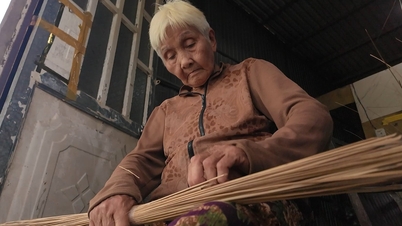
Many people like to go swimming on hot days - Photo: THUY DUONG
Ms. NML, 32 years old, living in District 10, Ho Chi Minh City, said that on extremely hot days like today, she bathes 5-7 times a day. Whenever she feels sweaty and hot, she takes a bath to feel less hot. She has been coughing for the past few days, but this has not stopped Ms. L. from bathing many times a day.
Even though it's hot, you shouldn't bathe too much.
Doctor Nguyen Viet Hau, head of the emergency department at the University of Medicine and Pharmacy Hospital in Ho Chi Minh City, said that the body is in the sun, the environmental temperature is quite high, going home to take a bath immediately will lead to a sudden change in temperature and then the body's thermoregulatory center must work continuously.
Therefore, when you come back from the sun or sweat a lot, do not shower immediately but rest and wait for the sweat to dry for about 30 minutes. In addition, you should not shower many times a day to avoid the body's temperature changing continuously, which is not good for your health.
Dr. Hau said that bathing not only cleans the skin but also helps keep pores open, thereby releasing sebum and sweat on the skin surface. Bathing can also help regulate body temperature.
However, excessive bathing will affect the skin's surface microflora, losing beneficial bacteria when using many chemicals or antibacterial soaps.
In addition, in some people, these chemicals can affect the skin surface, causing changes in skin moisture, skin irritation, dry skin, stretch marks, cracked skin...
From there, breaking the physical barrier and changing the previous skin surface microflora can be the source of infection, especially in the elderly with weak resistance, people with existing skin diseases, and skin lesions in Cushing's syndrome, which can easily lead to infection.
According to research at the University of Wisconsin - Madison in the United States, people exposed to temperature changes are more likely to suffer from respiratory diseases. When that happens, the patient will have symptoms such as sneezing, coughing, sore throat.
Especially in the elderly or children, whose thermoregulatory systems are not fully adapted.
Sudden changes in temperature can be especially dangerous for people with asthma or allergies, as symptoms can worsen or trigger a new attack.
Bathing at night with cold water is even more dangerous.
Not only bathing during the day, but also due to the hot weather, many people bathe at night. Dr. Cao Dang Khang, head of the pediatric heart surgery department at the University of Medicine and Pharmacy Hospital in Ho Chi Minh City, said that bathing at night, especially bathing with cold water, can have some negative effects on the body, such as the difference in temperature between the body and cold water can cause the body to lose heat, making people with weak immune systems susceptible to colds.
Sudden changes in temperature can affect the dilation and constriction of blood vessels, alter blood pressure and affect blood circulation, which can increase the risk of stroke.
Taking a cold shower late at night before going to bed can cause difficulty sleeping. Not to mention, changes in blood pressure and heart rate can occur due to exposure to cold water, which is not good for people with heart disease and high blood pressure.
In particular, for people who already have atrial fibrillation, arrhythmia can occur more easily, affecting overall cardiovascular health.
To protect your health, you should not bathe late at night, especially after 11pm and with cold water. Instead, you should bathe in the morning, combined with exercise, to help your body feel refreshed, start a new day or bathe in the afternoon to relax your body, regain energy after a day of work," Dr. Khang recommends.
Source




![[Photo] Opening of the 14th Conference of the 13th Party Central Committee](https://vphoto.vietnam.vn/thumb/1200x675/vietnam/resource/IMAGE/2025/11/05/1762310995216_a5-bnd-5742-5255-jpg.webp)
![[Photo] Panorama of the Patriotic Emulation Congress of Nhan Dan Newspaper for the period 2025-2030](https://vphoto.vietnam.vn/thumb/1200x675/vietnam/resource/IMAGE/2025/11/04/1762252775462_ndo_br_dhthiduayeuncbaond-6125-jpg.webp)

![[Photo] The road connecting Dong Nai with Ho Chi Minh City is still unfinished after 5 years of construction.](https://vphoto.vietnam.vn/thumb/1200x675/vietnam/resource/IMAGE/2025/11/04/1762241675985_ndo_br_dji-20251104104418-0635-d-resize-1295-jpg.webp)




































































































Comment (0)